LADY OXFORD
By SIR ANGUS WATSON
NO one who ever had a conversation of any length with Lady Oxford is likely to forget it. It is some five years now since I spoke at two meetings with her at the North of England and spent the evening with her afterwards. Some of the conversation it would be indiscreet to detail and some of it is irrelevant, but a
few of Lady Oxford's judgements on public men may be of interest still.
Mr. Churchill. " A good man, incapable of harbouring malice or lack of charity for anyone. He is a brilliant man, but is too impulsive to be a safe guide, and needs with him a man of equal measure to help him in his judgements. Lord Beaverbrook, with whom he is very intimate, is, in my view, a bad influence."
Franklin Roosevelt. "He told me twenty years ago that he would never do anything, as he was paralysed in both of his legs. I replied, A man does not think with his legs. Some day you may be President of the United States.' That I said billy half seriously, but I recognised that he had the gifts for the position."
John Morley. "He had a spinsterish' mind and was not a really great man."
Lord Oxford. "The most giftea man I ever knew, generous to a fault, and entirely loyal to his friends. Speaking of Ireland, he said, No nation is competent to govern another against its will, so Ireland should have Home Rule.' Of the Treaty of Versailles he said, 'I see the seeds of a future war in it, No treaty should be signed in the country of a belligerent Power. This treaty should have been carefully prepared some time after the war was over and in a neutral country.' He had offered to assist Lloyd George with it, but he had refused to accept his services."
King Edward VIII. " An able boy governed by democratic instincts, but he would not have made a good king."
Kaiser Wilhelm. "I knew him well. He was arrogant, handsome and superficially clever, but he was badly brought up in childhood. His aunt told me that his mother was incapable of training her children wisely."
Mr. Neville Chamberlain. " A good man, and devoted to his country with singleness of purpose. I did not agree with his policy of appeasement, but admired him for it. He had never been in an aeroplane before he flew to Munich."
Mr. Lloyd George. "I told him when I read his Life' that I had been under the impression that the last war had been won by millions of unknown soldiers, but I now realised that he had won it himself."
Lord Northcliffe. "Had a bad influence on Lloyd George, who intrigued with him and gave him a great deal of private information which he should have withheld."
Her own Autobiography. "I asked John Morley whether I should accept the incredible sum of -£H,000 that I had been offered to write it. He said Yes, but write as you speak, and say what you feel.' Arthur Balfour's comment was 'Write the book by all means, but let me see it before you publish it.' 1 deleted three chapters on his advice, but I am not sure that he was right."
The Coalition Cabinit. "I know most of them and there is not one among them can hold a candle to Churchill. God has raised him for this special task. He is not a conventionally religious man, but I detected a deeper note in his recent speeches."
On Marriage. " Many men marry wives who are their intellectual inferiors and suffer accordingly. I do not know why they do this, as no marriage can be successful if the wife is not able to act as comrade to her husband as well as helpmeet."
On Women. "Women are merciless to their own sex, particularly to those who ignore their sex taboos.' I would expect forgiveness from a man much more readily than from a woman."
On Religion. " A person who has not a religious background is intellectually and spiritually blind. Life is impossible without religion. . . . It is lack of religion—love, sacrifice, truth and beauty— that makes me unhappy. This war may purify and release us."
By Lady Oxford's death the world loses a great deal of wit and no little wisdom.






















 Previous page
Previous page